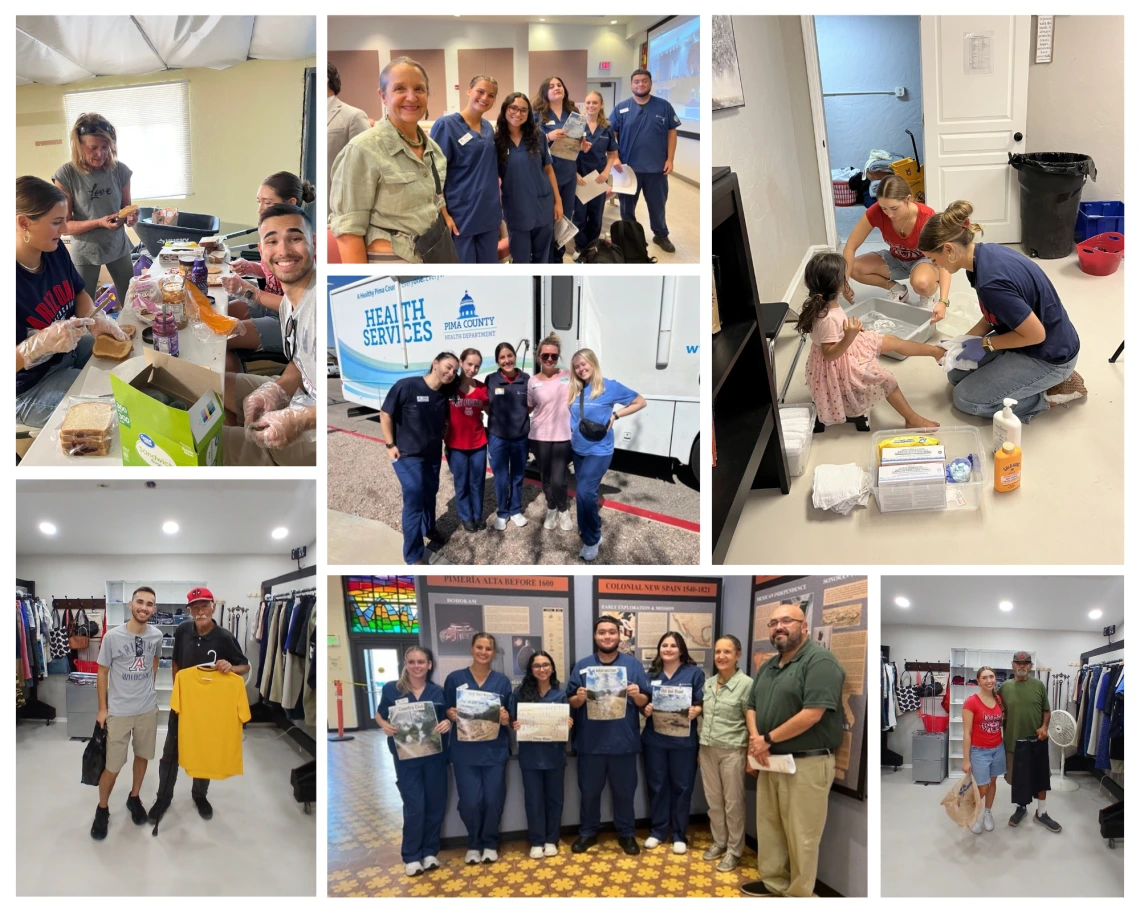Giving Back to Tucson: How nursing students are strengthening our community

At the College of Nursing, giving back to the community is an essential part of nursing education. The college prepares students to become competent and compassionate nurses who understand that care extends beyond the hospital and into the neighborhoods they serve. Through the NURS 473 Population Health and Community Nursing course, senior BSN students turn classroom learning into hands-on service that promotes health and wellness throughout Tucson. By giving back to the community, they strengthen both their nursing skills and their commitment to community-focused care.
Each semester, BSN students in the course complete a minimum of ten service-learning hours as part of the requirements, volunteering with community partners in Tucson and throughout Southern Arizona. These experiences extend students beyond the classroom into the heart of the community, where they engage directly with public health and social outreach initiatives. This exposure to important health resources and services helps students think more profoundly about their future patients and how they can assist them.
“Giving back to the community is at the heart of who we are as a college,” said Brian Ahn, PhD, dean of the College of Nursing. “Our students learn that nursing is not only about providing care, but also about serving others and strengthening the communities we call home.”
Working alongside organizations such as the Pima County Health Department, American Red Cross, and the Salvation Army, students help provide health education, essential resources, and compassionate support to those experiencing housing insecurity, food shortages, and other challenges. Earlier this year, the College of Nursing was honored as the 2024 Partner of the Year by the Southern Arizona chapter of the American Red Cross in recognition of its collaborative work and service-learning efforts. This recognition reflects the depth of students' and faculty's engagement in their community partnerships and the collective efforts that are making a lasting difference across Southern Arizona.
The impact of these volunteer efforts is visible throughout Tucson. Families have received life-saving smoke alarms and safety education, while homeless individuals have gained access to essential medical services, meals, and supplies. By supporting community events and public health initiatives, students help local organizations reach more people and strengthen the programs many depend on.
In several neighborhoods, student projects have even triggered lasting improvements, including increased attention to safety and infrastructure needs. This semester, nursing students delivered a presentation to the Pima County Board of Supervisors about the need for paved roads in Summit, Arizona, so children could have year-round access to school transportation. The community was mainly low-income and Spanish-speaking, making it hard for their voices to be heard. With the students stepping in to represent them, a recommendation to the board for funding to pave the roads was successfully made.
Students also support various faith-based and nonprofit organizations across the city, approaching each opportunity with empathy and understanding. In some situations, they choose not to wear clinical uniforms to help clients feel more at ease, especially when uniforms might trigger difficult memories of hospitals or incarceration.
Students often describe their volunteer service as a powerful and eye-opening experience. After volunteering with a faith-based organization to assist the unhoused, one student shared, “My biggest takeaway from volunteering is how much the simplest conversation can mean to someone. It was refreshing for them to have someone listen and engage. These experiences have led me to feel more confident in my communication skills, especially when talking to someone in a vulnerable state.”
Experiences like these demonstrate how nursing students, guided by the college’s commitment to service, can make a meaningful difference through compassion and advocacy. Even after finishing their required service hours, many students continue to volunteer regularly at organizations, generously giving their time to these causes.
Kate Straub, MPH, RM, BSN, RN, NCSN, co-faculty with Nancy McGuckin, MPH, MBA, MSN, RN, and Julio Loya, PhD, RN, CMSRN, for the NURS 473 course, agrees that this kind of community work prepares students for compassionate and holistic nursing practice. “Community work is a deeply humanizing and transformative experience,” said Straub. “My goal is to show nurses there is a profoundly fulfilling and meaningful career that awaits them outside the hospital.”
The College of Nursing shapes future nurses through community service, emphasizing the integration of clinical knowledge, empathy, and leadership. Working with community partners, students develop both clinical expertise and a deep sense of compassion, respect, and human connection—qualities central to exceptional nursing. These experiences enable students to improve lives, strengthen local neighborhoods, and inspire others to lead with empathy and purpose.

